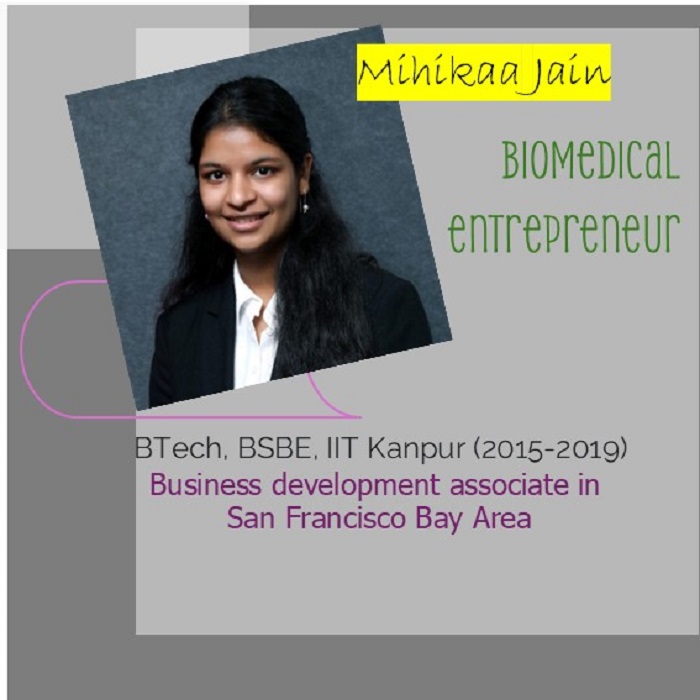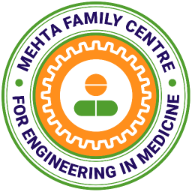
featuring
Mihikaa Jain
A business development associate in San Francisco Bay Area.
Mihikaa is an IIT Kanpur Alumnus, (2014-2019) and a BTech graduate in Bioengineering from department of Biological sciences and Bioengineering. Mihikaa spearheads establishing business partnerships and corporate strategy for biotech startup, particularly in the cell & gene therapy space.
MFCEM: Hello Mihikaa, it is wonderful to connect.
For the sake of our readers, let me tell that you completed your undergrad from IIT Kanpur in Biological sciences and Bioengineering, and went on to do your masters in Translational Medicine and now you are a part of the biotech startup in the San Francisco Bay Area in the capacity of a Business Development Associate.
First and foremost, how do you find the biotech startup-ecosystem? From academics to Biotech/Healthcare industry, was the transition a natural progression? I think the first part of this question overlaps with the second question later. Let’s combine the two?
Mihikaa Jain: The biotech startup ecosystem in the Bay Area is an exciting, dynamic space to navigate. I’ve had the privilege of interacting with a wide range of innovations—from optimizing backend healthcare processes to pioneering CRISPR therapeutics, developing portable MRIs, and leveraging AI in biotech. Two things stand out to me:
First, building a new therapeutic product often requires deep expertise. In biotech, it’s common to see founders with PhDs and years of industry experience, whereas in other industries, many find it possible to achieve success in their entrepreneurial journey right after undergrad.
Second, I’ve found that people here are incredibly purpose-driven. Many have personal stories that fuel their passion, and this sense of purpose makes the community focused on problem-solving and delivering real outcomes.
As for my own journey, it hasn’t been linear. I enjoyed the science at IIT Kanpur but quickly realized I didn’t want to work in a lab. I was much very much interested in learning about new innovations, meeting people, and experiencing the quicker, tangible results of my efforts. I found myself drawn to the business side of things, which led me to Bain, where I spent a few years in consulting. That experience was transformative, offering me immense growth and the chance to hone my business acumen across various industries.
After three years at Bain, I felt ready to apply my skills more directly to life sciences. That’s when I decided to pursue a Master's in Translational Medicine at UC Berkeley and UCSF. The program was exactly what I needed—a deep dive into the intersection of technology and business in life sciences, from IP protection to FDA approvals.
Post-graduation, I transitioned into business development, starting with a platform company in cell and gene therapy. My time at Bain helped quite a lot in shaping my strategic thinking and commercial acumen, but I’m still learning and growing as I understand the specific nuances of doing business in biotech. I believe in the concept of being a “student for life,” always pushing myself to explore new frontiers.
To summarize, the transition wasn’t a natural progression—it was a deliberate choice to specialize on the business side of life sciences, which is why I pursued my Master's.
MFCEM: How do you evaluate the scope and reach of startups in the Biotech and Healthcare sector. What are the different ways one could be a part of the ecosystem? I am answering only the second part of this question.
Mihikaa Jain: There are multiple ways to get involved and be a part of the biotech/ healthcare startup ecosystem (even without building your own startup)
- Investing: Be a part of VC investing into early-stage biotech companies
- Joining a venture studio or accelerator program are other related options
- Services: Providing consulting services for legal, finance, business strategy, marketing, PR, product design, manufacturing, etc. for biotech startup companies
- An interesting role is with Tech Transfer Offices at universities to help spin off IP from academia into startups
- Work with a startup: The most talked about option probably, but with good reason. The cliché is true – a startup allows you to put on a lot of different hats, learn on the job very quickly and constantly develop new skillsets. It is also easy to transition from one function/ department to the other. One should think about the scale of the startup they wish to join depending on the risk appetite and expectations from the role.
MFCEM: Being part of a startup makes one realize the number of skillsets that are required besides one’s formal training. How could someone starting young, equip oneself better? Do you wish there were a wider range of electives even at an undergrad level, for instance? Does having hands-on experience help?
Mihikaa Jain: Absolutely. Whether it’s startups or the broader industry, there are so many on-the-job skills to learn, especially in non-technical roles. In technical fields like R&D, your education plays a more prominent role in both success and hiring. But in non-technical roles—project management, business development, strategy—you quickly realize that soft skills like stakeholder management, prioritization, and time management are critical. These are typically learned through experience, not formal training.
At IIT Kanpur, I’m grateful for the chance to hold leadership roles in student bodies. These experiences shaped my soft skills early on, and I feel they have been instrumental in my professional success.
As for electives, I definitely think we need more options. When I was an undergrad, for instance, immunology wasn’t part of the curriculum, despite being so relevant today for new age therapeutics. On the non-technical side, an elective on customer discovery or building business strategies for deep tech innovations would be incredibly valuable. I took a course like this during my Master’s, and it proved to be very relevant later on.
MFCEM: Here in India, the biotech startup-sector is receiving much fillip. In academia too affirmative steps are being taken to provide necessary training in this space. For instance, IIT Kanpur, has set up the Mehta Family center for Engineering in Medicine, and has announces a new M.Tech. program in Biomedical Engineering. What would you like to tell your younger peers contemplating a career in the biotech and healthcare industry.
Mihikaa Jain: My advice to my younger peers:
- Network: Talk to as many people in the industry as you can. Attend events, ask questions, and learn what various roles entail. The more conversations you have, the clearer it becomes what might interest you.
- Keep an Open Mind: Early in your career, you might not always know what you want. If a role interests you and you connect with the people, give it a shot. Doing the job is often the only way to truly discover your interests and competencies. Don’t be afraid to ask for more responsibility if you’re doing well, and explore roles across different departments.
- Trust the Process: Hindsight is 20/20, and you’ll eventually find your path. Don’t be discouraged if things don’t work out right away—just keep going.

